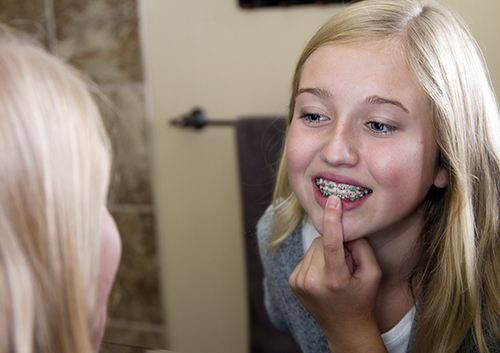What Your Braces Rubber Band Color Says About You
January 13th, 2016

However you may feel about having to wear braces, choosing the color of your rubber bands is sure to bring a smile to your face. Whether you want to express your creativity, coordinate your braces with your outfits, or show some serious school spirit, decorating your mouth with colorful bands takes some of the stress and self-consciousness out of wearing braces. So what do your rubber band colors say about you? Look no further than our rubber band horoscope.
Red. You’re intense and forward thinking, and that you won’t back down no matter how big the challenge. Red is also the color of the heart, so red rubber bands indicate that you’re a caring, loving person.
Blue. Blue means you’re chill – as cool as a cucumber. You’re one cool customer, as the saying goes. You’re relaxed and calm, even when your mom says you can’t chew any gum or eat popcorn because of your braces.
Green. Look at a traffic light and green means go, right? So you’re the type of person who’s always on the move. Go, go, go! It also means you’re generous and kind. Green is the color of nature and spring, so it says you love Mother Earth. Perhaps you even recycle. Green is the color of good luck.
Orange. You’re daring and wild, flamboyant and fun. Orange may indicate you’re an artist or a drama student. It says you have a big personality and that you don’t care what other people think about you. However, orange is also the color of balance and energy. And being flamboyant and fun takes a lot of energy!
Purple. You’re the creative type, for sure. You beat to a different drummer and think outside the box. It says you're mysterious. Purple is the color of royalty, and when you wear your purple rubber bands you are royally cool.
Color Combinations
What if you can’t choose just one color? Well, you can decorate your teeth with alternating colors. You can choose the colors of your favorite sports team or holiday colors like red and green. If you’re still stumped as to what colors to choose, ask Dr. Martin or a member of our team. We can let you in on all the trends our other patents are sporting at our Pleasant Hill, CA office!
Tips for Handling and Avoiding Orthodontic Emergencies
January 6th, 2016

The best way to avoid orthodontic emergencies is to know how to take care of your braces properly throughout your entire treatment. However, emergencies are … well, emergencies, and sometimes no matter how cautious you are or how well you take care of your braces, the wires loosen, the bands pop, or you experience orthodontic discomfort.
Common orthodontic emergencies include broken braces, poking wires, lost or broken retainers, mouth sores, and mouth injuries sustained playing sports, which often happens when you don’t wear a mouthguard to protect your teeth and appliance.
Food
It’s important to avoid foods that can damage your braces. Most people wear braces for about two years. All chewy, sticky, crunchy, and hard foods should be avoided during that time. While this may seem like a long time to go without popcorn or bubble gum, hard foods can break the brackets of your braces and sticky foods can bend the wires. If you have a loose wire, don’t try to fix it yourself. Call Jennifer L. Martin, DDS. In the meantime, if a wire is poking into your cheek or lip and causing irritation, put wax or a wet cotton ball over it to dull the sharp edge.
Pain and Discomfort
Some discomfort is a normal part of orthodontic treatment, especially in the hours after the braces are placed on your teeth or after a recent tightening or adjustment. However, if the pain doesn’t subside in three to five days, it’s a good idea to schedule an appointment at Jennifer L. Martin, DDS. Until then, try dissolving a teaspoon of salt in an eight-ounce glass of water and gargling with the solution. Over-the-counter pain medication will relieve discomfort, too.
Playing Sports
Just because you wear braces doesn’t mean you can’t play sports. You just need to take some extra precautions. Sports-related injuries to the mouth and jaw are common. The best way to protect your mouth and your appliance is to wear a mouthguard. There are several different types of mouthguards available, so be sure to ask Dr. Martin what’s best for you.
Brushing and Flossing
In order to keep your braces in good condition and avoid orthodontic emergencies, it’s important to brush and floss thoroughly after every meal. It’s easy for small particles of food to get trapped in your braces, and if the food isn’t removed, it gets wedged between the teeth and gums and causes plaque.
Need more tips on how to avoid orthodontic emergencies? Just ask any member of our Pleasant Hill, CA team.
What's the best dental floss?
December 30th, 2015

Dental floss is similar to a lot of products that depend mainly on the consumer’s preference. Fact is, floss comes in a wide variety of flavors, coatings, and other variations, but all types of floss essentially do the same thing. After all, that is what is most important: that the dental floss you buy is functional—cleaning the areas in between your teeth. If you want to know what the best dental floss is, the answer is the kind that enables you to successfully and regularly clean those areas. So to help you find the right type of floss for you, here are some options.
Flavored Dental Floss
Many people that floss prefer a flavored dental floss because it freshens their breath even more than unscented floss. The latter can also take on the smells associated with bacteria in your mouth. And we all know how bad that can be. So, if flavored dental floss is what you prefer, and it allows you to floss your teeth regularly, then it is automatically best for your mouth.
Flossers
There are also products on the market called flossers, which usually consist of a plastic instrument with strung floss and a pick on the opposite end. This option can be both effective at cleaning the areas in between your teeth and scraping off plaque. These flossers also come flavored in mint and various other varieties.
Gentle Dental Floss
Some people find that typical dental floss is too harsh on their gums. For that reason some companies make floss with soft coatings that are less abrasive on the gums. For the most part these types of floss are just as effective as regular floss, and for those people that require a more sensitive approach to flossing, especially when just starting out, this is the best option.
Of the aforementioned options, it is difficult to name an absolute best type of floss. However, Dr. Martin and our team say that the type of floss that works best for you, giving you the greatest chance of succeeding at regular flossing, is the best. For more information on floss, contact our Pleasant Hill, CA office.
Does smoking affect oral health?
December 23rd, 2015

By now, everyone knows that smoking is bad for you. But the truth is its broad-reaching health effects are not all known by everyone. This is especially true of oral health. Smoking can have serious repercussions in this regard. To give you a better idea of how smoking can affect your oral health, Dr. Martin and our team have listed some issues that can arise.
Oral Cancer
Oral cancer can have steep ramifications for anyone that gets it. Surgery can be required to eliminate the cancer before it spreads to more vital parts of your body. Any type of cancer is about the worst health effect you can get, and this especially holds true to the affects that smoking has on your mouth. The type of mouth surgery required with oral cancer can leave your face deconstructed in certain areas, and it is all due to smoking or use of other tobacco products.
Tooth Discoloration and Bad Breath
At the very least, it is fair to say that as a smoker you will often have bad breath, and while you may try to cover it up with gum or mints, tooth discoloration is a whole other story. The chemicals and substances in cigarettes stick to your teeth staining them brown and yellow colors that are increasingly difficult to disguise.
Gum Disease and Loss of Bone
Another effect of smoking is the increased risk of gum disease. Your gums may start to recede, which can eventually lead to the loss of teeth. Smoking can also increase bone loss and density in your jaw which is vital to the health of your mouth. Gum disease and bone loss are two signs that smoking is definitely bad for your mouth.
When it comes to the health of your mouth, the question is not whether smoking affects your health, it's how does it affect your health and to what degree. If for no other reason than because smoking involves your mouth as its entry point, it is safe to say that it can have long-lasting and detrimental consequences on your oral health.
To learn more about smoking and your oral health, contact our Pleasant Hill, CA office to schedule an appointment with Dr. Martin.






